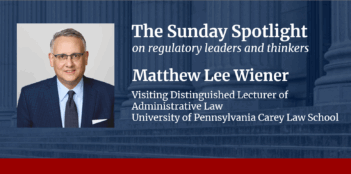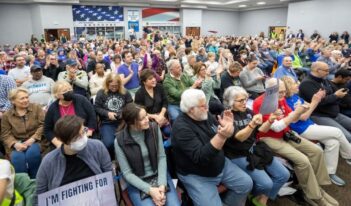
ACUS recommends allowing nonlawyers to represent parties in agency adjudications.
Participants in administrative adjudicative proceedings can benefit from representation or other forms of assistance, as even seemingly straightforward adjudications may pose challenges in accessing accurate information and navigating complex procedures. People may forgo rights and benefits to which they are entitled when they must navigate adjudicative proceedings without representation or assistance. Agencies also stand to benefit from increased representation and assistance, resulting in fewer delays and errors and less strain on agency resources.
Despite these benefits, participants cannot always afford or find legal representation and assistance. For years, agencies have tried to fill this gap by allowing nonlawyers to represent or assist participants in some adjudicative proceedings.
Increasing access to nonlawyer representation and assistance is a long-standing concern of the Administrative Conference of the United States (ACUS). In 1986, ACUS first recommended agencies permit and encourage nonlawyer representation and assistance in “mass justice” agency proceedings with high volumes of claims or disputes involving individual benefits. Recent ACUS recommendations further emphasize the importance of allowing representation by nonlawyers with relevant expertise and establishing rules that authorize qualified nonlawyers to practice before agencies. In addition, ACUS’s burden-reduction efforts, such as making adjudicatory processes simpler and more accessible, complement the goals of expanding and professionalizing assistance and representation.
In 2024, ACUS returned to nonlawyer representation when it began a project to map and define the spectrum of nonlawyer representation and assistance available to participants in administrative adjudications. This project evaluated who represents participants, what nonlawyer representatives do on behalf of participants, the structure of the proceedings in which nonlawyers most appear, and the regulatory schemes governing nonlawyers in various agency adjudications. The project defined assistance to encompass a broader spectrum of support, including helping a party to navigate a form or benefits application, educating on process, and general counseling concerning rights and remedies.
As part of this project, statutory and regulatory materials were reviewed, alongside roughly six months of interviews with various stakeholders concerning adjudications before 15 federal agencies. This research, reflected in a report, revealed six models of nonlawyer representation and assistance. In the first model, agencies accredit and oversee detailed regulatory programs. In the second, agencies rely on experts from other fields to represent and assist parties as an extension of their expertise. The third model consists of nonlawyer representation by individuals with an institutional or familial connection to the matter. Individual choice forms the catch-all fourth model, and assistance programs are the fifth. State programs, the final model, allow certain nonlawyer representation when implementing federal programs.
Notable findings from the report also include that nonlawyer representation particularly benefits specialized populations, including veterans, tribal members, persons with disabilities, and disaster survivors. Community-based organizations often possess the trust and expertise needed to serve these populations effectively. In addition, stakeholders repeatedly mentioned that community members possess deep factual knowledge that strengthens their representation. It was also clear that developing programs for representation within community-based organizations can inspire public confidence in government processes.
Relying on this report, ACUS adopted Recommendation 2024-7, Nonlawyer Assistance and Representation in Agency Adjudications, at its December 2024 plenary session. The recommendation builds on prior ACUS recommendations by identifying best practices for agencies to increase the availability of nonlawyer representation and assistance to participants in adjudicative proceedings. ACUS aims to increase access to justice and to ensure equitable outcomes for all participants in agency adjudications.
In the recommendation, ACUS encourages agencies to enable nonlawyers, such as friends, family, social workers, or counselors, to assist participants throughout the adjudicative process. This representation may include helping with tasks such as filling out forms and getting records or providing moral support during interviews or hearings.
ACUS further recommends that agencies establish reasonable qualifications for nonlawyer representatives while being mindful not to add unnecessary burdens. Although qualifications help to ensure competent representation, burdensome requirements can be counterproductive, especially when they reduce the availability of nonlawyer representatives. When deciding whether a nonlawyer is qualified, ACUS encourages agencies to consider the factors articulated in ACUS’s 2024 Model Rules of Representative Conduct, which include the representative’s relationship to the participant, knowledge, experience, skills, and fitness to serve.
Crucially, there is no one-size-fits-all solution to increasing access to justice in federal adjudications, as the recommendation recognizes. Instead, agencies should choose the right level of accreditation, training, and oversight for each type of adjudication. For example, detailed regulatory programs with greater agency involvement in accrediting and oversight might be most appropriate for agencies that conduct adversarial—or trial-like—adjudications with formal evidentiary hearings, adjudicate a high volume of cases involving historically underserved communities, or involve specialized or technical subject matter. Conversely, other agencies could be better served by allowing participants more leeway to choose their representatives in adjudications that arise sporadically or are very informal.
Although ACUS encourages agencies to allow nonlawyer representatives when appropriate, it recognizes the importance of ensuring competent representation. As a result, ACUS advises agencies to create rules governing the conduct and ethical obligations of nonlawyer representatives, including procedures for reviewing, adjudicating, and, if necessary, sanctioning alleged violations.
As the recommendation notes, it is critical to evaluate the uptake, effectiveness, and burdens imposed by any program seeking to expand representation and assistance. ACUS urges agencies to collect data on nonlawyer representation and assistance to evaluate if their rules are successfully expanding access to representation without adding undue burdens. ACUS also encourages agencies to collaborate on program evaluation to share knowledge that can foster a more accessible and transparent framework for nonlawyer representation.
The federal government has led the way in innovating expansive programs for representation and assistance in adjudication. Understanding the various models identified and the best practices advanced in ACUS’s recommendation can provide further guidance to federal agencies as well as state and local governments.
The views expressed in this essay are those of the authors and do not necessarily represent the views of the Administrative Conference of the United States or the federal government.
This essay is part of a series, titled “Toward a More Accessible and Accountable Administrative State.”





